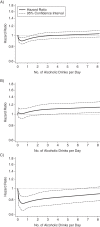The Association Between Alcohol Consumption and Lung Carcinoma by Histological Subtype
- PMID: 26672017
- PMCID: PMC4706677
- DOI: 10.1093/aje/kwv170
The Association Between Alcohol Consumption and Lung Carcinoma by Histological Subtype
Abstract
Alcohol is a carcinogen suspected of increasing lung cancer risk. Therefore, we prospectively evaluated the relationship between alcohol consumption and lung carcinoma in 492,902 persons from the National Institutes of Health-AARP Diet and Health Study. We used Cox models to calculate hazard ratios and 95% confidence intervals, adjusting for tobacco smoking and other potential confounders. Between 1995/1996 and December 31, 2006, there were 10,227 incident cases of lung carcinoma, classified as adenocarcinoma (n = 4,036), squamous cell carcinoma (n = 1,998), small cell carcinoma (n = 1,524), undifferentiated carcinoma (n = 559), and other (n = 2,110). Compared with nondrinking, alcohol consumption was associated with a modest nonlinear reduction in total lung carcinoma risk at lower levels of consumption (for 0.5-<1 drink/day, HR = 0.89, 95% confidence interval: 0.82, 0.96) but a modest increase in risk in the highest category (for ≥7 drinks/day, HR = 1.11, 95% confidence interval: 1.00, 1.24). Regarding histological type, alcohol was associated with a nonlinear reduction in squamous cell carcinoma that became attenuated as consumption increased and a modest increase in adenocarcinoma among heavier drinkers. Cubic spline models confirmed these findings. Our data suggest that the relationship between alcohol consumption and lung carcinoma differs by histological subtype.
Keywords: alcohol consumption; cohort studies; lung cancer.
Published by Oxford University Press on behalf of the Johns Hopkins Bloomberg School of Public Health 2015. This work is written by (a) US Government employee(s) and is in the public domain in the US.
Figures

References
-
- Ferlay J, Soerjomataram I, Ervik M et al. . All cancers (excluding non-melanoma skin cancer): estimated incidence, mortality and prevalence worldwide in 2012. In: GLOBOCAN 2012: Estimated Cancer Incidence, Mortality and Prevalence Worldwide in 2012. Version 1.0. (IARC CancerBase no. 11) Lyon, France: International Agency for Research on Cancer; 2013. http://globocan.iarc.fr/Pages/fact_sheets_cancer.aspx Updated January 6, 2015. Accessed June 1, 2015.
-
- American Cancer Society. Cancer Facts & Figures 2013. Atlanta, GA: American Cancer Society; 2013.
-
- National Cancer Institute. Lung cancer prevention (PDQ®). 2014. http://www.cancer.gov/cancertopics/pdq/prevention/lung/Patient/page1/All... Updated May 12, 2015. Accessed June 1, 2015.
-
- International Agency for Research on Cancer. Consumption of Alcoholic Beverages. (IARC Monographs on the Evaluation of Carcinogenic Risks to Humans, vol. 100 E) Lyon, France: International Agency for Research on Cancer; 2012:472.
Publication types
MeSH terms
Grants and funding
LinkOut - more resources
Full Text Sources
Other Literature Sources
Medical

